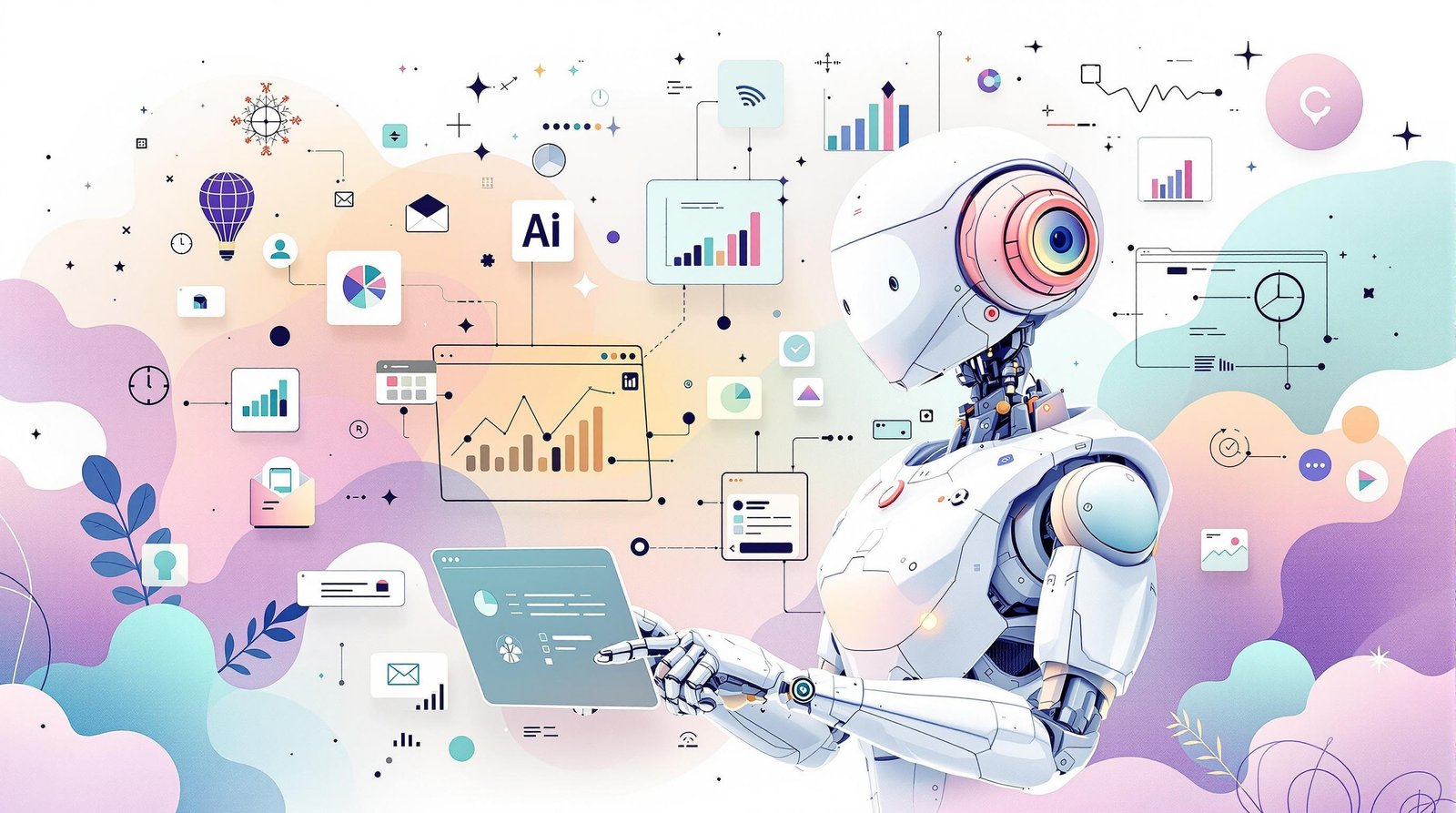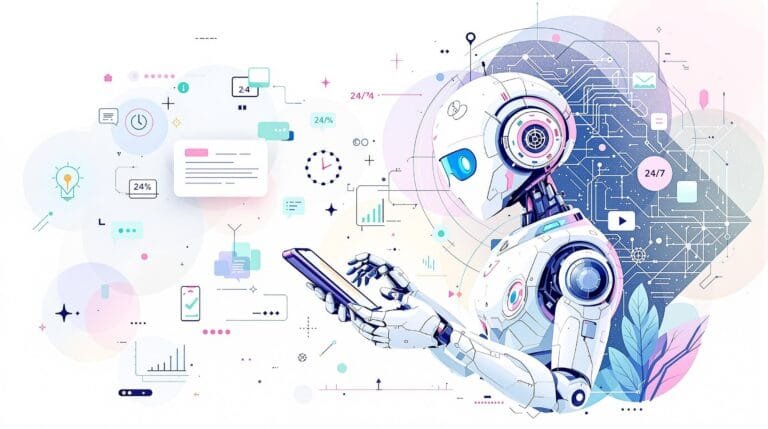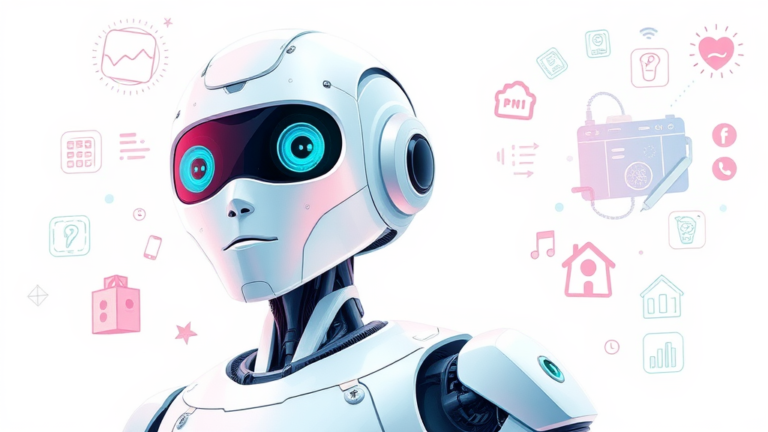
How Can Businesses Leverage AI Assistants?
Estimated reading time: 10 minutes
Key Takeaways
- ERP Revolution: AI transforms ERP systems from static databases into proactive advisors, slashing manual work by up to 50%.
- E-commerce Wins: Personalized recommendations and 24/7 chatbots can boost sales by 40%+ while cutting support costs.
- Customer Love: Instant, tailored engagement isn’t a luxury—it’s what 68% of buyers now expect.
- Start Simple: Focus on one high-impact area (like lead qualification) before expanding AI’s role.
Table of Contents
- AI Assistants for Small Businesses: Doing More with Less
- AI Assistant Strategies for Startups: Scale Smart, Not Hard
- AI-Powered Assistants for Marketing Automation: Work Smarter, Sell Faster
- AI-Powered Chatbots for Sales: Your 24/7 Sales Team
- AI Assistants in HR and Recruitment: Hire Better, Faster
- AI for Streamlining Business Processes: Cut the Chaos
- AI for Internal Communication in Companies: No More Email Ping-Pong
- AI Assistants in Enterprise Resource Planning (ERP): Your Data’s New Best Friend
- AI Assistants in E-commerce Growth: The Personal Shopper Every Brand Needs
- How AI Improves Customer Engagement: From “Meh” to “More!”
- Conclusion: AI Assistants Aren’t the Future—They’re the Now
- Key Takeaways
- FAQs
- Additional Resources
Picture this: Your coffee shop just got a flood of online orders, but instead of panicking, your team calmly focuses on perfecting lattes while an AI assistant handles inventory, tracks deliveries, and replies to customer messages. No magic—just smart automation. The question isn’t whether AI assistants are useful, but how to deploy them strategically. Let’s unpack how businesses of all sizes are using these tools to streamline workflows, cut costs, and keep customers hooked.
AI assistants—from chatbots to predictive analytics tools—are reshaping how companies operate. They’re not just for tech giants anymore. A recent study by Zartis found that 63% of businesses using AI assistants reported faster decision-making and 45% saw higher customer satisfaction. Whether automating invoices How AI Can Save Your Business Time And Money Through Automation or personalizing marketing campaigns AI Customer Service Agent Revolution, AI isn’t a luxury—it’s a necessity for staying competitive.
AI Assistants for Small Businesses: Doing More with Less
Small businesses often juggle limited budgets and tight teams—but that’s where AI shines. Imagine an AI tool that answers customer queries 24/7 How Can AI Help Business while you sleep, or automatically sends invoices so you never chase payments again How AI Can Save Your Business Time And Money Through Automation.
Cost-Effective Automation
- Chatbots for Customer Service: Platforms like Microsoft 365 Copilot allow small businesses to deploy AI-driven chatbots without coding. These bots handle FAQs, process orders, and even upsell products. One bakery owner cut response times by 70% using a chatbot for custom cake inquiries (Microsoft).
- Streamlined Compliance: AI tools track regulatory changes and auto-update compliance checklists. A local accounting firm reduced audit prep time by 50% using AI for tax regulation monitoring.
- Voice Assistants for Accessibility: Voice-based AI tools help employees with disabilities navigate systems, creating inclusive workplaces.
AI Tools Small Businesses Love
| Tool | Function | Example Use Case |
|---|---|---|
| Chatfuel | Chatbot Builder | Booking appointments via SMS |
| QuickBooks AI | Expense Management | Auto-categorizing transactions |
| Zoho Inventory | Stock Tracking | Predicting low-stock alerts |
AI Assistant Strategies for Startups: Scale Smart, Not Hard
Startups need to move fast, but scaling too quickly can lead to chaos. Enter AI assistants: your secret weapon for automating the mundane and fueling data-driven growth.
Building an AI-First Culture
- Start Early: Integrate AI during product development. A fintech startup used AI to automate customer onboarding, reducing manual data entry by 80%.
- Adaptable Systems: Tools like Zapier let startups connect apps without developer help. For example, auto-syncing Shopify sales to Google Sheets for real-time inventory updates.
- ROI Tracking: One SaaS company saved 12 hours/week by using AI to transcribe and summarize client calls.
Pro Tip: Focus on one process (e.g., lead generation) before expanding. Think of AI as a Swiss Army knife—use the right tool for the job. AI Automation For Business Success
AI-Powered Assistants for Marketing Automation: Work Smarter, Sell Faster
If your marketing team spends hours on social media posts or email campaigns, you’re leaving money on the table. AI can automate repetitive tasks while making campaigns more personal.
Tools That Pack a Punch
- Content Generation: Tools like Jasper create blog drafts, social captions, and ad copy in seconds. A travel agency boosted website traffic by 40% using AI for SEO-optimized content (MoveWorks).
- Hyper-Targeted Campaigns: AI analyzes customer behavior to segment audiences. One e-commerce brand saw a 25% lift in conversions by tailoring emails based on browsing history.
- Social Media Management: Platforms like Hootsuite use AI to recommend optimal posting times and hashtags.
Top Marketing Automation Platforms
| Platform | Key Feature | Best For |
|---|---|---|
| HubSpot | Multi-channel Campaign Tracking | B2B Lead Nurturing |
| Salesforce | Predictive Lead Scoring | Enterprise Sales Pipelines |
| Mailchimp AI | Behavioral Email Triggers | Small Business E-commerce |
AI-Powered Chatbots for Sales: Your 24/7 Sales Team
Ever wish your sales team could clone itself? AI chatbots can’t pour coffee, but they can qualify leads, answer questions, and book meetings while your team sleeps.
Real Results, Real Fast
- Lead Qualification: Chatbots ask pre-set questions to filter high-potential leads. A software company increased qualified leads by 30% in 3 months.
- Upsell Opportunities: Bots recommend products based on purchase history. One fashion retailer boosted average order value by 18% with AI-driven suggestions.
- CRM Updates: Chatbots auto-log interactions in systems like Salesforce, keeping records accurate.
Fun Fact: 56% of customers prefer chatbots for quick inquiries—they’re faster than waiting on hold for a human (MoveWorks).
AI Assistants in HR and Recruitment: Hire Better, Faster
HR teams drowning in resumes? AI can screen candidates, onboard new hires, and even nudge Jane from accounting about her benefits—all without a single spreadsheet.
From Hiring to Retiring
- Resume Screening: Tools like HireVue analyze resumes for keywords and soft skills. A logistics company cut hiring time by 40% using AI to shortlist candidates.
- Onboarding Automation: New hires get personalized training plans and FAQs via chatbots.
- Employee Wellness: AI assistants remind staff about mental health resources or deadline breaks.
Common HR AI Tools
| Task | AI Solution | Outcome |
|---|---|---|
| Interview Scheduling | Calendar Integration Bots | Reduced scheduling conflicts by 60% |
| Benefits Enrollment | Conversational AI Guides | 90% employee completion rate |
| Feedback Collection | Sentiment Analysis Tools | Identified burnout risks early |
AI for Streamlining Business Processes: Cut the Chaos
Why manually track inventory when AI can predict shortages? Or waste hours on invoices when software auto-matches receipts to payments?
Finance & Operations Hacks
- Expense Management: Apps like Expensify snap photos of receipts and auto-file expenses.
- Supply Chain Optimization: AI predicts shipping delays by analyzing weather and traffic data. A manufacturer avoided $200k in losses by rerouting shipments during a storm.
- Fraud Detection: Banks use AI to flag unusual transactions in real-time.
Bottom Line: AI isn’t just about speed—it’s about precision. One retailer reduced stockouts by 55% using AI demand forecasting (MoveWorks).
AI for Internal Communication in Companies: No More Email Ping-Pong
Ever lost an hour searching Slack for a project update? AI can tag key messages, schedule meetings, and even draft summaries.
Collaboration Made Simple
- Smart Search: Tools like Microsoft Teams’ AI find files or messages using natural language (e.g., “Find Q3 sales deck”).
- Meeting Assistants: Otter.ai transcribes calls and highlights action items.
- Knowledge Management: AI organizes internal docs so anyone can find the IT password policy in seconds.
Pro Tip: Start with one pain point—like reducing meeting prep time—then expand.
This is the first half of the blog. Stay tuned for actionable steps to implement AI assistants and real-world case studies.
AI Assistants in Enterprise Resource Planning (ERP): Your Data’s New Best Friend
Ever tried asking your ERP system a question? With AI assistants, you can. Imagine saying, “Show me last quarter’s top-selling SKUs in the Midwest,” and getting an instant report. By integrating AI into ERP platforms, businesses are turning clunky workflows into conversational gold.
Smarter Resource Management
- Automated Data Entry: AI scrapes invoices, purchase orders, and shipping logs—no more manual input. A construction supplier reduced payroll errors by 34% after automating time tracking through AI How AI Can Save Your Business Time And Money Through Automation.
- Predictive Analytics: AI crunches historical data to forecast demand shifts. One apparel brand slashed overstock by 22% using AI-driven inventory predictions.
- Compliance Alerts: AI monitors global regulations like GDPR and auto-updates ERP protocols.
ERP Systems Supercharged with AI
| Platform | AI Feature | Business Impact |
|---|---|---|
| SAP S/4HANA | Real-time Analytics | 20% faster financial closing |
| Oracle ERP Cloud | AI-Powered Supply Chain Insights | 15% reduction in procurement costs |
| Microsoft Dynamics 365 | Natural Language Queries | 30% fewer IT support tickets |
Did You Know? Enterprises like Leidos saved 8,000+ hours monthly by letting AI assistants handle routine ERP tasks. Think of AI as your ERP’s co-pilot—handling grunt work so your team can strategize.
AI Assistants in E-commerce Growth: The Personal Shopper Every Brand Needs
Remember when online shopping felt like browsing a dimly lit warehouse? AI turns e-commerce into a curated boutique. A skincare startup saw a 40% sales jump after their AI assistant suggested products based on skin type quizzes.
Tailoring the Journey
- Hyper-Personalized Recommendations: AI analyzes browsing history, cart abandonment rates, and even mouse movements. A furniture retailer boosted conversions by 27% with dynamic “You Might Also Like” suggestions.
- 24/7 Support Chatbots: AI handles returns, tracks orders, and answers sizing questions—even at 3 AM.
- Dynamic Pricing: Algorithms adjust prices in real-time based on demand and competitor activity.
Top AI Tools for E-commerce
| Tool | Function | Example Outcome |
|---|---|---|
| Klevu | Visual Search & Recommendations | 35% higher average order value |
| Zendesk Answer Bot | Instant Customer Support | 50% faster resolution times |
| Dynamic Yield | Personalization Engine | 20% lift in repeat purchases |
Pro Tip: Pair AI product suggestions with limited-time offers. “Customers who viewed this also bought” works best under deadline pressure.
How AI Improves Customer Engagement: From “Meh” to “More!”
Picture this: A customer texts, “What’s the vegan option?” and your AI bot replies instantly with a menu link and a discount code. That’s engagement on steroids.
The Instant Gratification Edge
- Multi-Channel Consistency: AI ensures your brand voice stays unified across email, SMS, and social DMs. A gym franchise cut response time discrepancies by 65% using an AI chatbot.
- Sentiment Analysis: Tools like Intercom detect frustration in messages and escalate issues automatically.
- Loyalty Boosts: AI remembers birthdays, anniversaries, and purchase milestones—like a barista who never forgets your name.
Metrics That Matter
| KPI | Pre-AI | Post-AI |
|---|---|---|
| Customer Satisfaction (CSAT) | 78% | 92% |
| Average Response Time | 8 hours | 12 minutes |
| Repeat Purchase Rate | 22% | 41% |
Source: MoveWorks
Fun Fact: 68% of customers pay more for brands that personalize engagement. AI isn’t just efficient—it’s a profit driver.
Conclusion: AI Assistants Aren’t the Future—They’re the Now
From espresso-sized startups to enterprise giants, AI assistants are the Swiss Army knives of modern business. They slash costs in ERP systems, turn e-commerce carts into goldmines, and make customers feel like VIPs. The data’s clear: Brands using AI outpace competitors in efficiency, sales, and loyalty.
But here’s the catch—AI isn’t a “set and forget” tool. It’s a collaborator. Start small: Automate one stubborn process, like invoice matching or Facebook replies. Measure the win, then scale.
FAQs
-
How much does implementing AI assistants cost?
Costs vary by scope—many tools offer tiered plans. We help businesses find ROI-positive solutions. -
Can AI work with our legacy systems?
Yes! Most AI platforms integrate with common ERP, CRM, and CMS systems. -
Will AI replace our customer service team?
No—it handles routine queries so your team can focus on complex issues. -
How long does AI integration take?
Simple chatbots: 2-4 weeks. Full ERP integration: 3-6 months. -
Is AI secure for handling sensitive data?
Reputable platforms use encryption and compliance frameworks like SOC 2. -
Can AI assistants learn industry-specific jargon?
Absolutely—they’re trainable on your products, protocols, and terminology. -
What if our team isn’t tech-savvy?
Modern AI tools prioritize user-friendly interfaces and require minimal coding.
Additional Resources
- Guides: Microsoft’s AI Playbook | MoveWorks Case Studies
- Tools: HubSpot, Zendesk, Klevu, SAP S/4HANA
- Consultation: Book a Free AI Audit
Hungry for more? Dive into our AI Solutions Library or ping us to brainstorm over coffee (virtual or real!).






